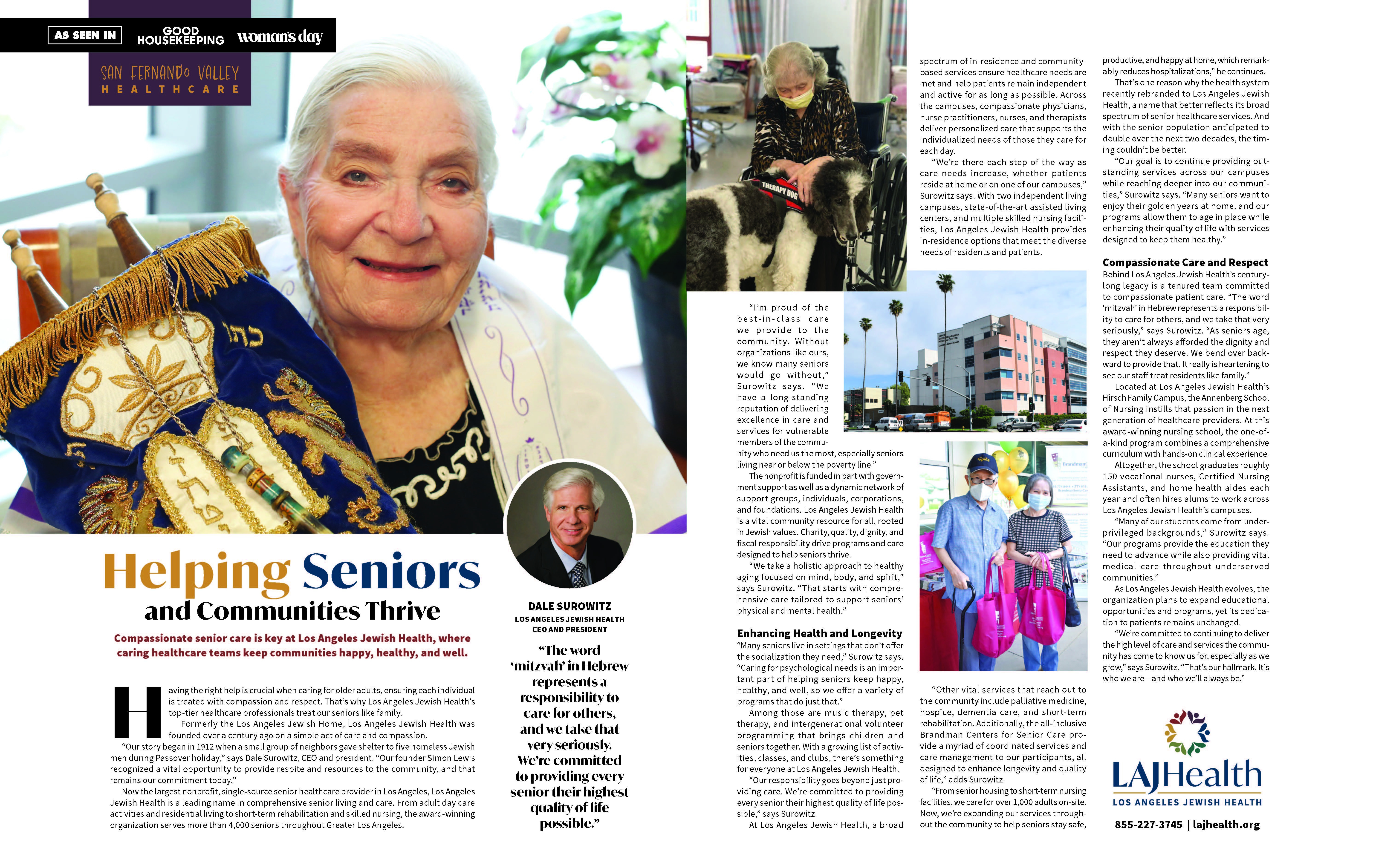Helping Seniors and Communities Thrive
Helping Seniors and Communities Thrive
Compassionate senior care is key at Los Angeles Jewish Health, where caring healthcare teams keep communities happy, healthy, and well.
Having the right help is crucial when caring for older adults, ensuring each individual is treated with compassion and respect. That’s why Los Angeles Jewish Health’s top-tier healthcare professionals treat our seniors like family.
Formerly the Los Angeles Jewish Home, Los Angeles Jewish Health was founded over a century ago on a simple act of care and compassion. “Our story began in 1912 when a small group of neighbors gave shelter to five homeless Jewish men during Passover holiday,” says Dale Surowitz, CEO and president. “Our founder Simon Lewis recognized a vital opportunity to provide respite and resources to the community, and that remains our commitment today.”
Now the largest nonprofit, single-source senior healthcare provider in Los Angeles, Los Angeles Jewish Health is a leading name in comprehensive senior living and care. From adult day care activities and residential living to short-term rehabilitation and skilled nursing, the award-winning organization serves more than 4,000 seniors throughout Greater Los Angeles.
“I’m proud of the best-in-class care we provide to the community. Without organizations like ours, we know many seniors would go without,” Surowitz says. “We have a long-standing reputation of delivering excellence in care and services for vulnerable members of the community who need us the most, especially seniors living near or below the poverty line.”
The nonprofit is funded in part with government support as well as a dynamic network of support groups, individuals, corporations, and foundations. Los Angeles Jewish Health is a vital community resource for all, rooted in Jewish values. Charity, quality, dignity, and fiscal responsibility drive programs and care designed to help seniors thrive.
“We take a holistic approach to healthy aging focused on mind, body, and spirit,” says Surowitz. “That starts with comprehensive care tailored to support seniors’ physical and mental health.”
Enhancing Health and Longevity
“Many seniors live in settings that don’t offer the socialization they need,” Surowitz says. “Caring for psychological needs is an important part of helping seniors keep happy, healthy, and well, so we offer a variety of programs that do just that.”
Among those are music therapy, pet therapy, and intergenerational volunteer programming that brings children and seniors together. With a growing list of activities, classes, and clubs, there’s something for everyone at Los Angeles Jewish Health.
“Our responsibility goes beyond just providing care. We’re committed to providing every senior their highest quality of life possible,” says Surowitz.
At Los Angeles Jewish Health, a broad spectrum of in-residence and community-based services ensure healthcare needs are met and help patients remain independent and active for as long as possible. Across the campuses, compassionate physicians, nurse practitioners, nurses, and therapists deliver personalized care that supports the individualized needs of those they care for each day.
“We’re there each step of the way as care needs increase, whether patients reside at home or on one of our campuses,” Surowitz says. With two independent living campuses, state-of-the-art assisted living centers, and multiple skilled nursing facilities, Los Angeles Jewish Health provides in-residence options that meet the diverse needs of residents and patients.
“Other vital services that reach out to the community include palliative medicine, hospice, dementia care, and short-term rehabilitation. Additionally, the all-inclusive Brandman Centers for Senior Care provide a myriad of coordinated services and care management to our participants, all designed to enhance longevity and quality of life,” adds Surowitz.
“From senior housing to short-term nursing facilities, we care for over 1,000 adults on-site. Now, we’re expanding our services throughout the community to help seniors stay safe, productive, and happy at home, which remarkably reduces hospitalizations,” he continues.
That’s one reason why the health system recently rebranded to Los Angeles Jewish Health, a name that better reflects its broad spectrum of senior healthcare services. And with the senior population anticipated to double over the next two decades, the timing couldn’t be better.
“Our goal is to continue providing outstanding services across our campuses while reaching deeper into our communities,” Surowitz says. “Many seniors want to enjoy their golden years at home, and our programs allow them to age in place while enhancing their quality of life with services designed to keep them healthy.”
Compassionate Care and Respect
Behind Los Angeles Jewish Health’s centurylong legacy is a tenured team committed to compassionate patient care. “The word ‘mitzvah’ in Hebrew represents a responsibility to care for others, and we take that very seriously,” says Surowitz. “As seniors age, they aren’t always afforded the dignity and respect they deserve. We bend over backward to provide that. It really is heartening to see our staff treat residents like family.”
Located at Los Angeles Jewish Health’s Hirsch Family Campus, the Annenberg School of Nursing instills that passion in the next generation of healthcare providers. At this
award-winning nursing school, the one-of-a kind program combines a comprehensive curriculum with hands-on clinical experience. Altogether, the school graduates roughly 150 vocational nurses, Certified Nursing Assistants, and home health aides each year and often hires alums to work across Los Angeles Jewish Health’s campuses.
“Many of our students come from underprivileged backgrounds,” Surowitz says. “Our programs provide the education they need to advance while also providing vital medical care throughout underserved communities.”
As Los Angeles Jewish Health evolves, the organization plans to expand educational opportunities and programs, yet its dedication to patients remains unchanged. “We’re committed to continuing to deliver the high level of care and services the community has come to know us for, especially as we grow,” says Surowitz. “That’s our hallmark. It’s who we are—and who we’ll always be.”
